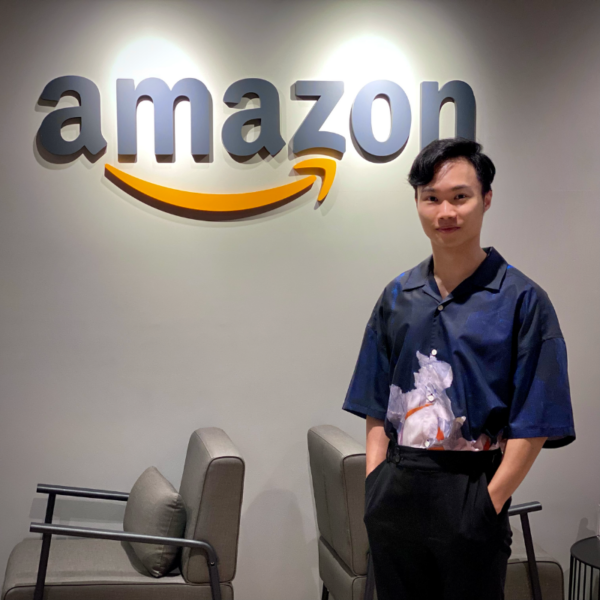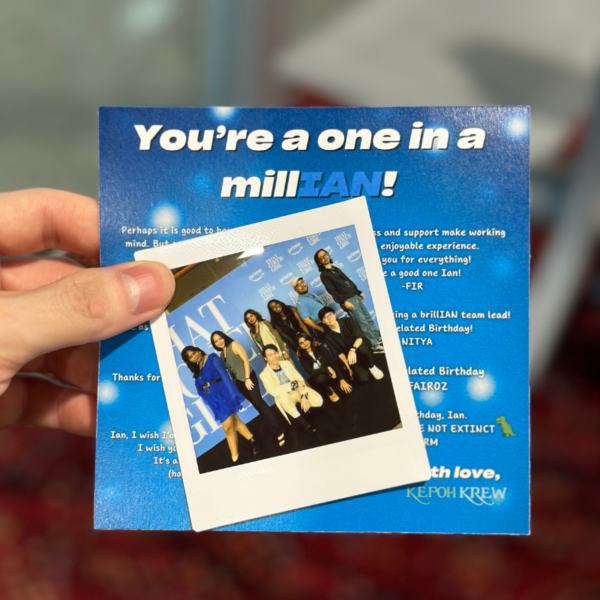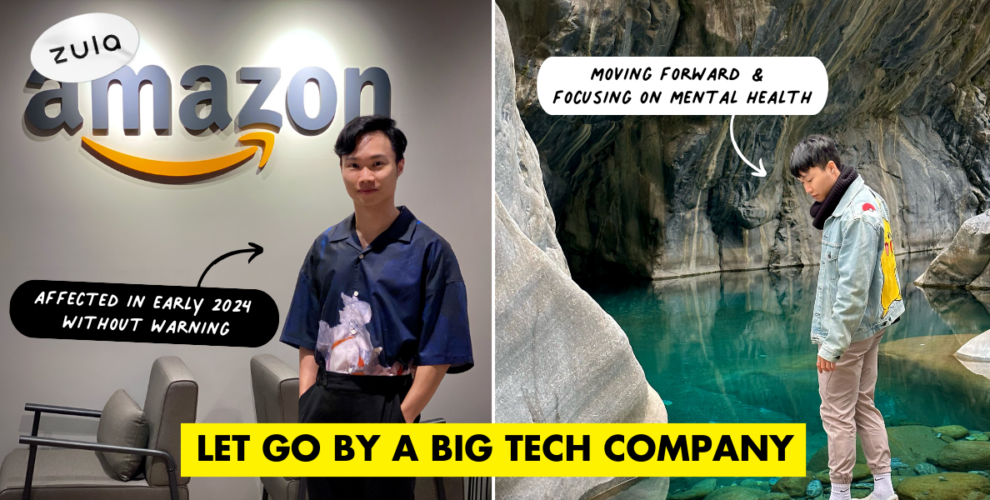Retrenched By Tech Company
Growing up, many of us have planned a set path ahead: go to school, graduate, and get a good job. After all, that’s more or less what adulting is, isn’t it? But with this idealistic Singaporean dream in mind, we don’t always consider the possibility of a drastic change — retrenchment.
For 33-year-old Ian, retrenchment was the last thing on his mind after working at Amazon Prime for nearly two years. In early 2024, he was informed of a sudden mass retrenchment and asked to leave the office premises within just three hours. What ensued was a period of Ian feeling lost and struggling to pick up the pieces.
While he has since managed to find a new job, Ian shared with us the harsh reality of what it’s like being retrenched by one of the biggest tech companies in the world.
Contents
Growing up and leaving a government job
 Ian when he was working at Amazon
Ian when he was working at Amazon
It’s common to hear children share their dream jobs while growing up — whether it’s imaginary jobs such as princesses or mermaids, to big dreams such as actors and policemen. Ian, however, admitted that he never had a dream job in mind.
“I think I just stumbled my way through the education system. I was from a triple science background in secondary school, but I jumped to arts in JC. Then, I went into filmmaking in university, with a vague sense that I’ll probably end up in content creation or marketing.”
With Ian’s easygoing personality, life was like trial and error for him. Upon graduation, he worked for the government for over seven years. He made short films, documentaries and reality TV-style videos at the Ministry of Sustainability and the Environment.
“But after a while, it got to a point where I wasn’t fully aligned with the content that I was producing. I felt like I had more to say and experience.”
It’s human nature to want to try out new things, after all, Kind of like how Rapunzel felt trapped in her castle and wanted to see the world, Ian felt the same. So, he started looking for jobs on LinkedIn and came across a job posting by Amazon Prime.
Getting a job at Amazon
 Ian on his first day at the Amazon office
Ian on his first day at the Amazon office
Applying for a new job was just the first step. Sitting through tough interviews was another. Amazon is well-known for their extensive and difficult interview process called The Loop.
“There were about five to seven interview stages, and each one of them asked situational questions. Rather than problem-solving, I was asked what I had done in my past experiences that showed I had the resourcefulness and capabilities to make important business decisions for the company.”
Going through The Loop, Ian described himself as feeling “hopeful and stressed at the same time”. But before he knew it, he was soon accepting a job offer and ready to start his first day of work at Amazon Prime as a Social Media Manager.
“When I got the job, all I could think of was ‘oh my god, it’s really happening.’ It was honestly beyond my expectations and I even texted all of my close friends.”
“During the first three months of the job, it felt like a startup, despite Amazon being a tech company with such a huge legacy. When you see or hear Amazon, you think of the retail side of things or their data systems like Amazon Web Services. But my time was with Amazon Prime Video, and they were a little late to the market, since there were other streaming services such as Netflix and Disney Plus that were around for much longer.”
 Ian receiving a token of appreciation from TikTok Singapore after working with them for a collab
Ian receiving a token of appreciation from TikTok Singapore after working with them for a collab
As Amazon Prime Singapore and Malaysia’s Social Media Manager, Ian’s day to day consisted of working with his social media teams in order to regularly post across all social media channels, preparing for big premieres, and organising large scale events with actors from all over the world.
“My favourite part of the job was that I was constantly challenged. When I worked in government, I felt that I was swimming against the tide almost all the time as I loved doing things out of the ordinary. But at Amazon Prime, my Manager consistently encouraged me to always be bold and that there was no harm in trying. To date, that’s still one of the best career lessons.”
But around a year and nine months into the job, Ian’s daily routine changed overnight.
Being retrenched without warning
 Ian travelling to Taiwan
Ian travelling to Taiwan
“At 9pm in January 2024, we got an email from one of the bigwigs in Amazon. Since it was January, I thought it would simply be an email to welcome us back to work at the start of a new year.
But as I read further, it became pretty alarming, as it covered thinking about Amazon’s future and the difficult decisions the company will be making.”
Feeling uneasy, Ian further elaborated that he couldn’t sleep well that night after reading the email. “I can’t describe the feeling. It just felt as if something was coming really soon. It was so ominous.”
Sure enough, the very next morning at work, Ian received an email to prioritise an important meeting with a higher-up and the company’s HR. His meeting was scheduled for 11am, which Ian joked that this number almost felt like a sign.
“My scheduled meeting related to the reorganisation came in on 11th January. It was for 11am. My own 11.11. Numerologists, please tell me what this means,” he joked.
Before said meeting, Ian was “conversing nonstop” with his colleagues, who had either gone for similar meetings before him, or were preparing themselves for the worst. Rumours about the retrenchment had spread throughout the office already, making him feel even more unsettled. Swathes of people were getting cut.
“The minute I opened the door, I could see from the higher up’s face that she was about to deliver serious news. I knew by then I was cut. The first thought I had when I heard the news was: oh my god, I have 14 people working under me who are about to get retrenched too.”
Instead of feeling anger, all Ian felt was pure shock. After all, he never saw this news coming. Plus, he didn’t even have time to process the retrenchment, as he was only given three hours to pack and leave the premises.
“I was told that once I walked out of that room with my letter, I had to vacate the premises by 2pm. My card and computer would stop working, and I would not have access to any system any longer.”
It was undeniably a tense atmosphere in the office. At this point, Ian was on autopilot, getting all the documents he needed from his computer before he would be denied access. There were even security guards lining the corridors, just in case there might be more expressive reactions to the news.
“What I’ll remember the most is the hugs that were going around the office. My colleagues and I were all sad or shocked. But we still had one another. It felt like a graduation that no one wanted.”
Also read:
How This 30-Year-Old Chose Happiness By Leaving Her Desk Job To Become A Food Delivery Rider
Moving forward from the retrenchment
 Ian working part time at Slippery Slope, an LGBTQ+ bistro
Ian working part time at Slippery Slope, an LGBTQ+ bistro
As if the day wasn’t hard enough on Ian, things managed to get even worse. Amazon Prime’s office was located on the 22nd floor, and just as Ian was leaving a one-way entry stairwell to have a private moment, the door closed on him. None of the supposed re-entries worked either. This meant he had to climb down 22 flights of stairs just to leave the office. Talk about bad timing.
Ian broke down while walking down the steps, questioning, “Why is nothing going right today?”
To Ian, the fact that the retrenchment decision was made by someone based thousands of miles away can’t even be called cruel. “They don’t know anything about us. It was just ‘good business.’”
Ian had colleagues who were foreigners who moved their entire lives to Singapore with their families and young children. Following the retrenchment news, they dealt with the undeniable stress of having to get a new job, or risk losing their right to even stay in Singapore.
“It showed how privileged I was as a Singaporean too. I didn’t have to worry about my accommodation or a new rental, because I could stay here, collect myself, and plan my next move. But my foreign colleagues only had three months to do so, otherwise they had to fly back home. It’s been over five months now and many of them have gone home.”
As a manager, Ian felt extra guilty for his social media teams — the people he brought in to lead. “I felt responsible for 14 people’s livelihoods that were affected by this retrenchment. I was very honest and open with my teams, and they to me; so I knew their career aspirations and even life milestones. I remember seeking counsel from and crying about how helpless I felt to those close to me.”
“All of us were sold a dream when we were onboarded to Amazon Prime. Southeast Asia was a big investment for Amazon and they believed in the region. But it was disappointing to let go of the hope that one day I’ll be able to promote a Singapore Original story. Because that was one of the drivers for me to work hard.
It made me wonder about big companies getting incentives to set up here, but how much trickles over to benefit Singaporeans?”
 Ian being a guest judge on Werq For Your Crown drag competition, which he supported in Amazon Prime’s capacity
Ian being a guest judge on Werq For Your Crown drag competition, which he supported in Amazon Prime’s capacity
Till today, Ian still feels that he hasn’t completely accepted the situation.
Rather than looking for a new job immediately, Ian wanted to put his mental health first. In the following three months, he read a lot of non-fiction books that dealt with understanding trauma and why we do the things that we do.
In recent times, ”funemployment” has become a trend among youths, a term which combines the words “fun” and “unemployment” together. As such, it’s a period where unemployed people use their spare time to travel and have fun. In this spirit and aware of his privilege, Ian travelled to Taiwan and Japan to try to get away from it all and focus on himself.
Ian then went on to take shifts at a local LGBTQ+ bistro for two months — a new challenge for himself as he had never worked in F&B before.
“I wanted to push myself to try new things. To put myself out there. To show up for friends and family. I couldn’t just focus on one thing because I kept feeling doubts and had questions all the time. Within the same day, I could feel alright in the morning, and then by afternoon I would think, why’s this happening? What’s my next move in life? I was forced to realise that I’ve been building my self-worth squarely on my work accomplishments.”
Working at a startup now
 Ian (left) and his current team on a work trip to Kyoto
Ian (left) and his current team on a work trip to Kyoto
In April, Ian joined a startup company called Narra, which is building at the intersection of Web3 and AI to create a gamified experience.
“At a startup, everything starts completely from scratch. You have full control over what the creative direction is, and every decision that you make will impact the company. I’m excited to be moving forward into this new phase of my life, but it definitely comes with a lot of pressure for sure.”
“Am I doing this right? Can I make this work? Will this succeed?”—These are some of the many questions and doubts that Ian had in mind when he first joined Narra. As someone who’s from the creative industry with a film background, he also felt threatened by AI taking over his job one day.
“It felt like every big company was using AI as a scapegoat to explain why they’re letting their employees go.”
But now with this startup company, he wants to see AI as a tool to help creatives instead, and it’s why he believes in his new journey.
Plans for the future
 Ian’s social media team’s birthday message for him
Ian’s social media team’s birthday message for him
Now, Ian’s day-to-day consists of hustling to make sure that Narra launches their product, and to build and strategise its marketing, social media presence, and community growth.
“I think the best life lesson that I took away from this experience is that the Singaporean mindset of being locked into one place and job can be very limiting. We’re always comparing, trying to outdo each other, earn more or be the first in everything. But I learned how important negotiating and compromising is, and I’m so grateful for that.”
Looking back now, Ian doesn’t think that he has any regrets.
“I wouldn’t have done anything differently. I aspired for both my teams and I, and challenged myself whenever possible. And more than colleagues, I made friends. At the end of the day, whatever happened really pushed me to learn and grow.”
As for his plans for the future? “Being nicer to myself first,” Ian admitted. “There was nothing I could have done to foresee or to prevent myself from being let go. I can be ambitious, but I can also take care of myself. I don’t have to dive headlong into one at the expense of the other.”
I Was Retrenched By Amazon Without Any Warning & Learned How To Get Back On My Feet
Nobody is ever fully prepared for a retrenchment. Through Ian’s story, he showed us that it’s important to prioritise yourself and ensure you are in the right mindset to cope with the sudden loss of a job, in order to move forward.
To other Singaporeans who may have gone through a similar retrenchment situation as Ian did, he wants to remind you — “Don’t be too hard on yourself.”
“Don’t ever blame yourself either. When you’re hard on yourself, you’re subconsciously hard on others too. This might result in sacrificing time with the people who mean the most to you, such as your loved ones, friends, and family. It’s a bad trade-off no matter how you look at it.”
All images courtesy of Ian.
Responses have been edited for brevity and clarity.
Also read:








